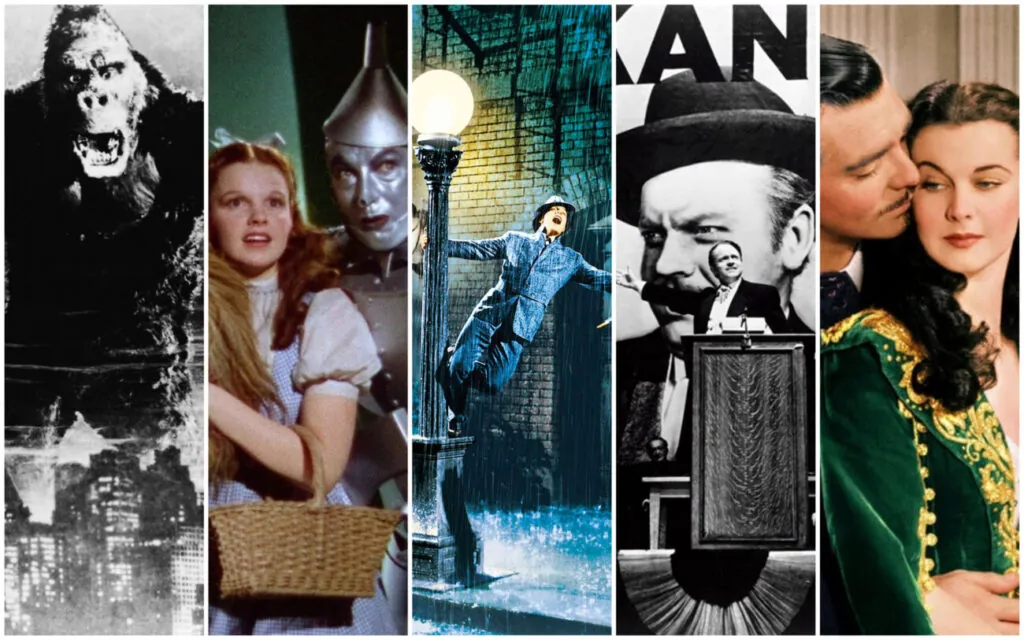Adverts
Hollywood Classics: The Golden Age
“Casablanca” (1942)
When it comes to must-see classics, “Casablanca” is almost always the first to come to mind. Directed by Michael Curtiz and starring Humphrey Bogart and Ingrid Bergman, this film is a masterpiece that blends romance, drama and the tense atmosphere of World War II.
The storyline is captivating and the performances are unforgettable. Plus, iconic phrases like “Here's looking at you, kid” have become part of pop culture. 🌟
Adverts
“Gone with the Wind” (1939)
Based on the novel by Margaret Mitchell, “Gone with the Wind” is an epic that portrays the American Civil War and its aftermath. Directed by Victor Fleming and featuring memorable performances by Vivien Leigh and Clark Gable, the film is a landmark in the history of cinema. Its grandiose settings and the depth of the characters make this a must-see for any film lover.
European Cinema and Its Treasures
“The Seventh Seal” (1957)
Directed by Ingmar Bergman, “The Seventh Seal” is a Swedish film that explores philosophical and existential questions through an engaging narrative. The famous scene in which the knight plays chess with Death is one of the most recognizable in the history of cinema. This is one of those films that really makes you think and reflect on life and death.
Adverts
“The Sweet Life” (1960)
Federico Fellini is a name that resonates strongly in European cinema, and “La Dolce Vita” is one of his masterpieces. The film follows the life of journalist Marcello Rubini, played by Marcello Mastroianni, as he navigates Rome’s high society. With its fragmented narrative and iconic scenes, such as Anita Ekberg’s at the Trevi Fountain, this is a film that captures the essence of the “dolce vita.”
The Power of Asian Cinema
“Seven Samurai” (1954)
Akira Kurosawa is one of the greatest directors in the history of cinema, and “The Seven Samurai” is probably his best-known work. This Japanese epic combines action, drama, and philosophy into a compelling story about honor and sacrifice. The film was so influential that it inspired countless remakes and adaptations, including the famous “The Magnificent Seven.”
“In the Mood for Love” (2000)
Although it is a more contemporary film, Wong Kar-wai’s “In the Mood for Love” is already considered a modern classic. The plot revolves around two neighbors who develop a platonic relationship while their spouses are frequently away. With stunning cinematography and an evocative soundtrack, this film is a true work of art.

Brazilian Cinema Classics
“Central do Brasil” (1998)
Directed by Walter Salles, “Central do Brasil” is one of the most internationally acclaimed Brazilian films. The story follows the journey of a retired teacher and a boy in search of his father. With powerful performances by Fernanda Montenegro and Vinícius de Oliveira, this film is a touching portrait of Brazilian reality.
“City of God” (2002)
If there is one film that put Brazilian cinema on the international map, it is “City of God”. Directed by Fernando Meirelles and Kátia Lund, the film portrays life in the favelas of Rio de Janeiro with brutal authenticity. The narrative is engaging and the cinematography is impressive, making this a must-see for any lover of the seventh art. 🎬
Related articles:
Documentaries That Changed Cinema
“The Man with the Movie Camera” (1929)
Directed by Dziga Vertov, “The Man with the Movie Camera” is one of the most innovative documentaries in the history of cinema. Using revolutionary editing techniques for the time, the film captures urban life in the Soviet Union in a way that had never been seen before. This is an essential film to understand the evolution of documentary filmmaking.
“Gimme Shelter” (1970)
Directed by the Maysles brothers, “Gimme Shelter” is a documentary that follows the Rolling Stones during their infamous 1969 tour. The film culminates with the tragic Altamont concert, where an audience member was murdered. This is a documentary that not only captures the essence of an era, but also serves as a powerful commentary on the end of the hippie dream.
- “Casablanca” (1942): Romance and drama in World War II.
- “Gone with the Wind” (1939): American Civil War and its consequences.
- “The Seventh Seal” (1957): Philosophical and existential reflections.
- “The Sweet Life” (1960): Life in high society in Rome.
- “Seven Samurai” (1954): Honor and sacrifice in feudal Japan.
- “In the Mood for Love” (2000): A modern classic about relationships.
- “Central do Brasil” (1998): Brazilian reality through a touching journey.
- “City of God” (2002): Life in the favelas of Rio de Janeiro.
- “The Man with the Movie Camera” (1929): Innovation in documentary cinema.
- “Gimme Shelter” (1970): Rolling Stones and the end of the hippie dream.
Conclusion
In short, exploring the treasures of cinema is a fascinating journey through the history of the seventh art. Hollywood classics such as “Casablanca” and “Gone with the Wind” transport us to the Golden Age with their engaging narratives and memorable performances.
Likewise, European cinema presents us with philosophical and visual masterpieces, such as “The Seventh Seal” by Ingmar Bergman and “La Dolce Vita” by Federico Fellini, which challenge our perception and make us reflect on existence.
Furthermore, Asian cinema offers us a unique perspective through films such as Akira Kurosawa's Seven Samurai, a masterful combination of action and philosophy, and Wong Kar-wai's modern classic In the Mood for Love, which captures the complexity of human relationships.
But, without forgetting the priceless classics of Brazilian cinema, such as “Central do Brasil” and “Cidade de Deus”, which reveal the social reality of the country with touching authenticity.
Finally, documentaries such as “The Man with the Movie Camera” and “Gimme Shelter” have changed the way we see the world around us, using innovative techniques and capturing defining historical moments.
Therefore, each of these masterpieces is essential to understanding the evolution of cinema and appreciating the cultural richness it provides.
For true film lovers, these films are not just entertainment, but gateways to different eras, cultures and realities. So don't miss the opportunity to discover and rediscover these cinematic treasures that continue to inspire and move generations. 🌍
Useful links
- Casablanca (1942) – IMDb
- Gone with the Wind (1939) – IMDb
- The Seventh Seal (1957) – IMDb
- La Dolce Vita (1960) – IMDb
- Seven Samurai (1954) – IMDb
- In the Mood for Love (2000) – IMDb
- Central Station (1998) – IMDb
- City of God (2002) – IMDb
- The Man with the Movie Camera (1929) – IMDb
- Gimme Shelter (1970) – IMDb




